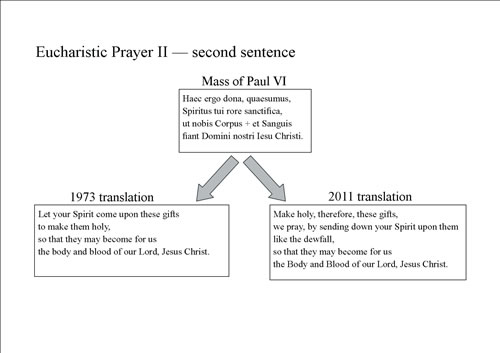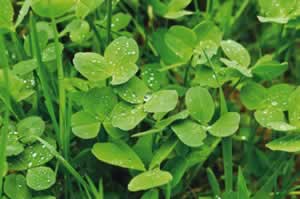Like the Dewfall
We are hearing a lot of Eucharistic Prayer II in the mass at present. It is the shortest of the Eucharistic Prayers and for many priests it is the one they are most confident with as they adapt to the new translation. Listening to the prayer, the first unfamiliar phrase is in the second sentence: “sending down your spirit upon them like the dewfall”. Seeing the texts side-by-side shows why:
The prayer is an epiclesis – a calling down of the Holy Spirit – a very important component of the whole Eucharistic prayer. Both translations communicate the gist of it; we are asking the Holy Spirit to come down upon the elements on the altar and to change them for us into the body and blood of Jesus. However there is one word in the Latin which the earlier translators took into the phrase “come upon”. That word is “rore” from the noun “ros, roris - dew; light rain; spray/splash water”.
I gather that the translation “dewfall” was chosen for euphony and to remove ambiguity. 
I draw attention to this single word because it introduces an unusual image of the Holy Spirit and how subtly God acts. We are accustomed to fire and wind as images of the Spirit. Dew gives a delightfully different mental picture. I am amazed by the contrast between fire and dew – both hinting at just how hard the Holy Spirit is to pin down.
As any gardener knows, the dew brings life. The wetting of the ground keeps the soil moist and open and gives plants just what they need for growth. The Holy Spirit is “the Lord, the giver of life” as we say in the Creed. The Spirit is acting on us as well as on the Eucharistic elements, preparing us to receive the Lord.
For those steeped in scripture the image of dewfall brings to mind the story of the Israelites wandering in the desert. Exodus 16 tells what happened after Moses prayed on their behalf:
In the evening quails came up and covered the camp; and in the morning there was a layer of dew around the camp. When the layer of dew lifted, there on the surface of the wilderness was a fine flaky substance, as fine as frost on the ground. When the Israelites saw it, they said to one another, “What is it?” For they did not know what it was. Moses said to them, “It is the bread that the LORD has given you to eat. (Ex 16: 13-15 NRSV)
The dew brought the manna with it. The manna in the desert is interpreted by Christians as a “type”; an Old Testament precedent for the New Testament fulfilment in the Eucharist. Just as the dew provided manna for the Israelites, the Holy Spirit provides the bread from heaven for us. A new translation can uncover hidden truths.

 Entries(RSS)
Entries(RSS)